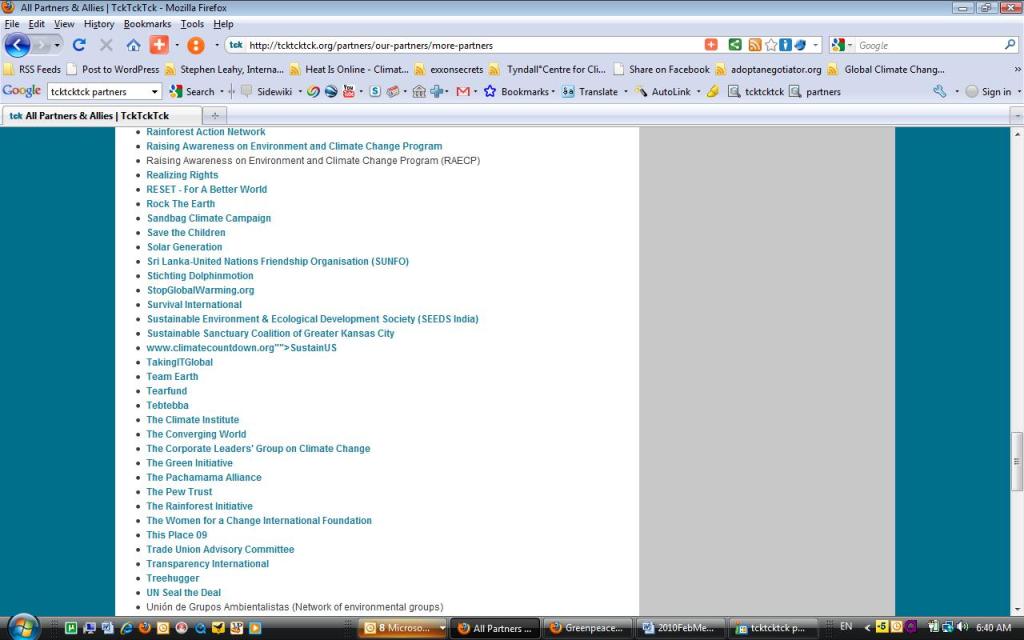Mar 14
20100
Conservation International, Environmental Defence Fund, Greenpeace, National Wildlife Federation, Natural Resources Defense Council, Nature Conservancy, Sierra Club, Union of Concerned Scientists, Wildlife Conservation Society
BINGOS Conservation International - Articles | News Corporations Environmental Defense Fund FoE REDD The Nature Conservancy Union of Concerned Scientists - Articles | News Woods Hole Research Centre
Controversial deal between US-based conservation NGOs and polluting industry slammed
Last week, an organisation called Avoided Deforestation Partners launched what they blandly describe as “an agreement on policies aimed at protecting the world’s tropical forests”. Under this agreement, “companies would be eligible to receive credit for reducing climate pollution by financing conservation of tropical forests”. It is a loophole allowing industry to write a cheque and continue to pollute. This is another nightmare vision of REDD, similar to that recently proposed by the Australian government. Another similarity with Australia is the support received from what is at first glance a surprising source: big international conservation NGOs.
REDD-Monitor received the following anonymous contribution about the agreement. We reproduce it in full in the hope of generating further discussion about this liaison between conservation NGOs and polluting industry.
The following organisations signed the agreement: American Electric Power, Conservation International, Duke Energy, Environmental Defense Fund, El Paso Corporation, National Wildlife Federation, Marriott International, Mercy Corps, Natural Resources Defense Council, PG&E Corporation, Sierra Club, Starbucks Coffee Company, The Nature Conservancy, Union of Concerned Scientists, The Walt Disney Company, Wildlife Conservation Society, and the Woods Hole Research Center.
The agreement is available here.
When, in years to come, the history is written of how humanity came to lose the battle against climate change, May 20th 2009 will go down as the day that the tide decisively turned against planetary survival. For this was the day that those with the influence and power who could have taken a stand of moral principle, and who could have demanded the kind of action needed to reduce greenhouse gas emissions in the US, decided not to. Instead, they offered some of the biggest, filthiest planetary polluters an ‘easy out’, by lobbying the US Congress jointly with them, that US carbon emissions should be offset against oversees credits for ‘avoided deforestation’.
Surprisingly, it was not the professional lobbyists, union leaders or government officials who demonstrated the loss of their moral compasses on May 20th. It was the big international conservation organisations who, we have all been led to believe, are supposedly looking after the planet’s wild places. In a statement issued alongside fossil fuel-burning power giants such as American Electric Power, and Pacific Gas and Electric Company, the conservationists – including The Nature Conservancy, Environmental Defence Fund, Conservation International and Wildlife Conservation Society – called for unlimited access for ‘avoided deforestation’ carbon credits in the American Clean Energy and Security Act (also known as the Waxman/Markey bill)- thereby potentially allowing major polluters not to make significant reductions in their own emissions for many years to come. In this, they were largely reaffirming what was already included in this desperately weak piece of draft legislation.
The interests of the big US international conservation NGOs (let’s call them BINGOS) and large corporations have been converging for some years. The BINGOs have realised that the fat profits of mining, utility and financial services companies are a ready source of income for their fast expanding empires. The corporations have realised that the compliant BINGOs are potentially their best green public relations’ agencies, if paid the right amounts of money. The BINGO’s spiralling budgets have grown ever more dependent on hand-outs from the private sector, and the Boards of all the main US conservation groups are now stuffed with corporate executives.
In fairness, the statement does recognise that the rights of indigenous peoples need to be respected in REDD programmes. However, the day before the BINGO-polluter love-note was announced, the chief scientist of one of the BINGO signatories – Peter Kareiva, of the Nature Conservancy – confirmed what many indigenous people and environmentalists already knew: that “the traditional protected areas strategy has all too often trampled on people’s rights”. Kareiva also said that “The key question is to what extent have we – and by “we,” I mean the big conservation NGOs such as The Nature Conservancy, Conservation International and WWF – mended our ways so that we no longer disrespect the rights of indigenous people in pursuit of our missions.” The fact that Kareiva still has to ask the question is telling in itself, in that the BINGOs have been told for many years that their anti-people approach is unacceptable and probably ultimately ineffective. TNC’s chief scientist rightly concluded that the entire protected areas strategy “warrants a critical re-examination”.
Kareiva also asked the question “Should the conservation movement be proud of the 108,000 protected areas around the world it has thus far helped establish?” Many indigenous people know the answer to that question, and it is why they remain deeply concerned and sceptical about grand international plans by conservation organisations to ‘protect’ their forests in order to supposedly prevent climate change.
Do the math, and it’s not hard to see why the BINGOs have finally sold their souls to the devil. Around 150 million hectares of tropical forests is in protected areas worldwide, much of it under the control or management of international conservation groups. Each hectare of forest contains around 100-200 tons of carbon, and each ton of carbon could be worth around $10 at the moment (and potentially much more in the future). The BINGOs know that they have a big stake in an asset potentially worth $150 billion and upwards.
But there would have to be a buyer for this asset to actually be worth anything. Step in the big fossil fuel-burning power utilities, which, like most US businesses, have been cosseted and protected from global environmental realities by eight years of the Bush administration. If there is an easy way to avoid changing their business model, of avoiding the installation of more efficient technology, or of losing market segment to renewable energy producers, they will surely take it. Avoided deforestation offsets on a grand scale – brokered by their chums in the conservation groups – would be just the ticket.
But as US environmental groups such as Greenpeace and Friends of Earth have pointed out, this is a sure route to climatic ruin. The terms of the Waxman/Markey bill as it stands – and as demanded by the BINGO-polluter axis – would allow the polluters to carry on polluting and will “lock in a new generation of dirty coal-fired power plants.”
These groups – organisations that, unlike the BINGOS, have not allowed themselves to grow bloated and complacent feasting at the teats of mammon – point out that “the American Clean Energy and Security Act sets targets for reducing pollution that are far weaker than science says is necessary to avoid catastrophic climate change. They are further undermined by massive loopholes that could allow the most polluting industries to avoid real emission reductions until 2027.” That is, they can largely be offset against ‘carbon credits’ bought from overseas projects, such as for putative ‘avoided deforestation’ schemes.
How has this potentially catastrophic turn of events come about? The decision-making process for the Waxman/Markey bill which will perpetuate the US’s addiction to fossil fuels was, we are told by the environmental groups “co-opted by oil and coal lobbyists”. Were the environmentalists slightly less polite, they might have added “and their trough-snouting apologists in the conservation BINGOs”.
And as we all know, where the US leads, the rest of the world tends to follow. If the Waxman/Markey bill becomes law, it is likely to set a precedent that negotiators at the Copenhagen climate summit in December will look to for inspiration.
So the May 20th statement is not just an act of egregious short-sighted greed and duplicity by the supposed conservationists; it is little more than an act of global environmental treachery. One of the coordinators of the joint statement, Jeff Horowitz of ‘Avoided Deforestation Partners’, describing the statement as a ‘landmark’, said “When environmentalists and major corporate leaders can agree, real change has come”. He is right, real change has indeed come, and it is a landmark: it marks the point that the conservation BINGOs finally abandoned any last pretence to be acting in the interests of the planet.
The gravy train may well be headed the way of the BINGOs, but the cost could be dangerous climate change that will eventually wipe out many wildlife habitats, including tropical forests. But when the good ship Mother Earth does start sinking, at least we’ll now know who should be the first to be thrown overboard.








